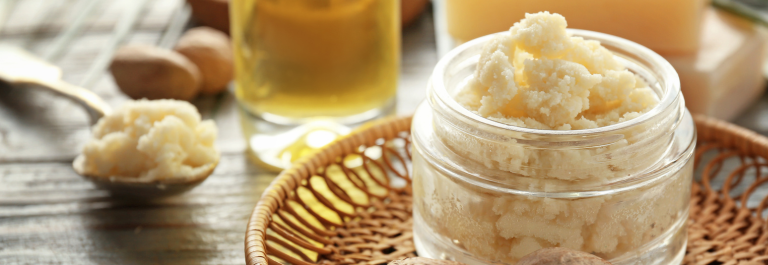Tree nut allergies are on the rise and can often affect those with eczema. This type of allergy can be just as fatal as a peanut allergy and is for some reason often overlooked by those outside of the medical community. My son has eczema and is allergic to almonds, walnuts, hazelnuts, and pecans, but not peanuts. I prefer to use natural, non-toxic products to moisturize his chronically dry skin, but most these products contain variations of oils that seem to be in the tree nut family, such as coconut oil, shea butter, and cocoa butter. Even some drug store creams contain these oils, so they almost seem to be unavoidable these days.
If you have a tree nut allergy, should you stay away from these oils? The answer I’m afraid is not so cut and dry. I’ve rounded up some facts to share so you can make an informed decision with your physician.
Coconut Oil for Eczema
Coconut oil and Palm Oil are the primary base in most natural soaps. Many use coconut oil for eczema treatments because it’s known as an excellent emollient and for it’s antibacterial properties. They are also in many balms and salves marketed for those with eczema. And recently many physicians, even Dr. Oz, have begun to encourage anyone with eczema or severely dry skin to try this nutrient rich oil either in cooking or applied directly to the skin. Coconut Oil is one popular and diverse oil!
My son has tree nut allergies and if eats coconut one day, he’s fine. If he eats it a second day in a row, he may break out in eczema and/or itching. We used to apply coconut oil to his skin, but now it makes him itchy.
But is coconut a tree nut?
Elizabeth from Onespot Allergy also has a son with tree nut allergies, but he doesn’t seem to have any trouble consuming coconut. She points out that there seems to be a lot of confusion around coconut and possible allergic reactions. Essentially, Dr. Watson from Allergic Living Magazine states the coconut is actually a large seed from a tree of the palm family. The FDA defines it as a tree nut. FAAN recommends speaking with your doctor if there is concern of an allergic reaction. It seems to be that most allergic reactions to coconut have occurred in individuals without a tree nut allergy. So in theory you should be able to eat a coconut or apply coconut oil to your skin if you have a tree nut allergy.
Shea Butter for Eczema
Like coconut oil, my son was originally ok with shea butter applied on his skin, but after time he developed a reaction to it. Products containing shea butter in high doses make his skin very itchy.
Is shea a tree nut?
FAAN and the FDA classify shea as a tree nut. According to Dr. Watson, shea nuts are indeed a tree nut, but there have been no documented allergic reactions to it. He states this is likely because the oil, used in skincare products, contains little protein, which is what triggers an allergic reaction. Dr. Kanwaljit K. Chawla of Mount Sinai School of Medicine conducted a study and found that shea butter only contains 1/3oth of the amount of proteins found in cashews and even less than the amount found in peanuts. Dr. Chawla introduced shea butter into blood samples from individuals with tree nut allergies and found the immunoglobulin E antibodies barely attached to the shea butter, so no allergic reaction occurred.
Although allergies to pretty much anything are possible, a true allergy to shea is very rare.
Cocoa Butter for Eczema
We have yet to try Cocoa Butter on my son’s skin, but I hope to soon. He eats chocolate with no problem, so it’s unlikely he’d react topically.
Is cocoa a tree nut?
Cocoa butter is derived from the cocoa bean, the same origin as chocolate. The beans grow in pods, and much like coconut, in different circles it is considered a tree nut, a seed, or a fruit. Allergies to the cocoa bean itself are extremely rare. In fact, reactions to chocolate are usually related to a shellfish allergy or cross contamination with nuts, dairy, soy, etc rather than connected to a true chocolate allergy. So, if you have a severe allergy to peanuts or other tree nuts, make sure your cocoa butter or chocolate is free from contamination with other nuts. As it turns out, cockroaches are quite fond of the cocoa bean and larger quantities than you’d like of these critters actually end up in many products derived from cocoa beans. Ick! Since cockroaches are related to shellfish, as are dust mites, some people with allergies to any of these items could potentially react to cocoa or cocoa butter.
The Bottom line: Speak with your physician if you have doubts about using coconut oil or shea or cocoa butter and always apply a very small amount of the oil/butter as a patch test before applying liberally to ensure you don’t have a reaction.
Please note that I am not a medical professional. You should speak with your physician before trying any of the oils mentioned above if you or your child have a tree nut allergy. It’s always better to be cautious.
Nourishing Soap Bar: Coconut and Sunflower Oil Soap Bar
Our Coconut and Sunflower Oil Soap Bar combines the nourishing properties of coconut and sunflower oils with shea butter to create a gentle yet effective cleansing experience. This soap bar is designed to hydrate and soothe the skin, leaving it feeling soft and refreshed. Infused with natural oils, it helps to maintain the skin's moisture balance while providing a mild lather that cleanses without stripping essential oils. Perfect for daily use, this soap bar offers a luxurious and eco-friendly alternative to conventional soaps.










